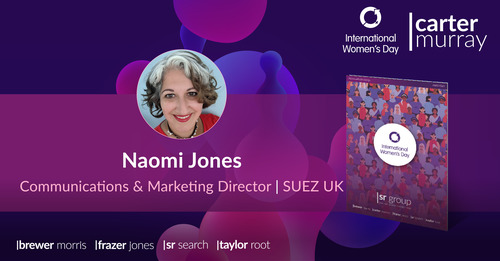IWD2021 #ChooseToChallenge: Naomi Jones

Disclaimer: Please note that all commentary and opinions provided in this interview are those of the individual and not the organisation/company they are employed by.
What skills and attributes do female leaders bring to create diverse leadership at management level?
We often say that women are good at softer skills but actually, I think it is more that a lot of female leaders are good at balancing two skill sets which appear to contradict each other but in fact are interdependent.
The first skill set is what we traditionally value in leadership – being driven, ambitious, visionary, determined and understanding the need to actively pursue your goals.
The second skill set is having emotional intelligence – having empathy, focusing on relationships, being able to read people and critically, being able to put your ego aside when needed.
All good leaders, whatever their gender, should have a combination of both skills.
What does “choose to challenge” mean to you?
If there was anything that 2020 taught us, it was that it is no longer ok to be passive. It was an eye opener for all of us.
We all have a role to play in challenging our own bias and looking at our own role in driving forward change. As a woman in a senior role, what I most want to do is to help those coming behind me. That is first and foremost about listening and learning and then identifying your role in helping to deliver the solution.
What is one lesson you learnt the hard way?
That there is a big difference between being collaborative and being a people pleaser. It is about respecting yourself as well as others. I am glad I went through the lessons I did though as it has influenced how I treat others and how I behave today.
How can female leaders ensure they get a seat at the table?
Women shouldn’t have to do anything differently to men but of course we know that in reality, it can be tougher for women to get into senior roles.
I think women should do the same things as men in terms of focussing on yourself and your skills, learning about wider business needs and risk profiling outside of your own role and being a rounded leader with a mix of skills sets.
In addition, and specifically for women, I have found focusing on my networks to be critical. Support networks and advocacy go a long way. Women need strategic support.
From a personal perspective, I have never regretted finding a partner in my personal life who has never been threatened by my ambition and believes thoroughly in equality and feminism, for both men and women. My parents and friends have also always rooted for me. In whatever way, surround yourself by cheerleaders and those who will challenge you in a good way.
What impact could Kamala Harris’ appointment to Vice President have on the next generation of female leaders?
She is an incredible role model and has shown the next generation the art of the possible. To me she is a perfect example of someone who has the two different skillsets that leaders should ideally have which I mentioned earlier.
What is one thing women don’t talk about enough?
Both their ideas – because they are good! – and the challenges they face.
What are you really, really good at?
I am good at relationships and understanding people and then I translate that into getting stuff done but in the right way.
What has held you back in your career to date and how did you overcome that barrier?
Having an idea of who I should be versus who I actually am and what I bring to the table.
I used to think that a Director was cool, calm, controlled and oozed authority. There is something in having a bit of that. But I am happy to have proven that you can also be respected and deliver as someone who isn’t afraid to be human, authentic and have a sense of humour.
What is your next adventure or goal?
Last year was the year for internal communications but this year we must return to a more holistic approach of looking at what engages employees. A lot of promises were made in 2020, now we need to look at how are we going to deliver them.
Why is it important that we “choose to challenge” and call out gender bias, discrimination and stereotyping?
If we don’t start, then no one will. Someone has to be brave and to start. Even if it tough. As a woman in a senior role, I want to do it for my team, the women I mentor and for my children, both my son and daughter. My husband and I want our son to grow up choosing to challenge as much as we do our daughter.
Click below to read the full edition of IWD2021 #ChooseToChallenge: Female Leaders Across The Globe. https://indd.adobe.com/embed/bb2678fd-fafb-4e5f-b57b-bbe97612e7cf?startpage=1&allowFullscreen=true